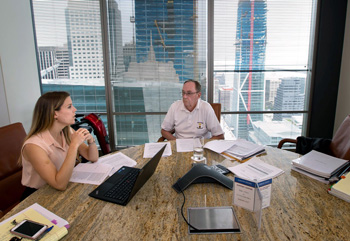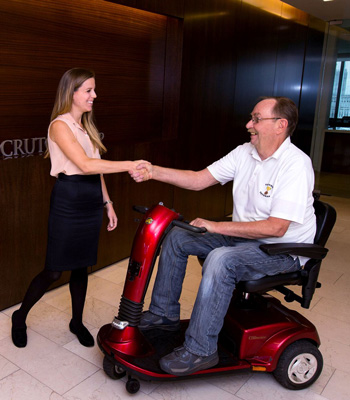Attorney training helps
veterans who are suffering
By Psyche Pascual
Staff Writer
It’s been 48 years since Murl
Craig was wounded in Vietnam, but those injuries are as fresh as if they
happened yesterday.
 |
| Army veteran Murl Craig worked with attorney Emily Aldridge to get benefits from the Veterans Administration. Photo by Darryl Bush. |
It took months to recover from injuries
suffered when his Jeep flipped over during the 1968 Tet offensive. The crash
broke his chest and collarbone and gashed one knee. Back in his hometown of
Walnut Creek, the symptoms multiplied. His feet were always cold and numb.
Walking across a room or stairs, he would stumble and fall. And then there were
the sleepless nights, bouts of unexplained anger and irrational behavior, all later
linked to post-traumatic stress disorder (PTSD).
“I still have nightmares and
flashbacks, and I do crazy things sometimes,” said Craig, now 69.
It was no wonder that Craig fell
on hard times and went to prison. In 1989, he had two heart attacks, both
linked to wartime exposure to the herbicide Agent Orange. When he got out in
2014, he filed for disability benefits from the Veterans Administration. But it
wasn’t until this year that Craig got them, mostly due to the pro bono help he
got from an attorney trained to help veterans apply for VA benefits.
Millions of veterans across
America need legal experts to get help from the VA.
 |
Veteran Murl Craig greets lawyer Emily Aldridge at her San Francisco office.
Photo by Darryl Bush. |
“Unfortunately, the process of
accessing and obtaining VA benefits is extremely complex and difficult to
navigate – particularly when you’re struggling to get your basic needs met,” said
Kate Richardson, legal services director for Swords to Plowshares in San
Francisco.
In fact, a VA veterans appeals
board denies about three out of every four combat veterans with post-traumatic
stress disorder who have less than honorable discharges, she said.
To work with the VA attorneys
must be accredited and complete three hours of legal education, which is why
groups like Swords to Plowshares encourage attorneys who can do pro bono work
to sign up for the Practising Law Institute’s free “Advocating
for Veterans” CLE.
The course is scheduled for Nov.
14 in San Francisco. Last year, more than 1,000 attorneys signed up for the
program online and in person.
Five years ago, when the program first started, there were fewer than 500 California lawyers accredited to represent veterans before the Department of Veterans Affairs, but that quickly tripled in the first two years, thanks to the State Bar’s promotion of the training event.
The State Bar, in its partnership with the PLI, continues to promote the training to various legal and academic organizations and helps speed the processing of accreditation paperwork through the VA so that people will not have to wait three to four months to become accredited.
For more information, see the State Bar page on Resources for Veterans.
Swords to Plowshares works with
more than 35 firms and corporations to connect members of the military with pro
bono lawyers who can guide them through their legal problems, such as applying
for disability benefits or discharge upgrades.
Veterans who don’t have access
to VA services because of less-than honorable discharges are twice as likely to
be commit suicide and more likely to be homeless.
In 2011, State Bar trustees like
Wells Lyman felt the need to train more pro bono attorneys was so great that
they pushed to get the bar involved in such efforts. Local bar associations were
already organizing pro bono help for vets, but with the State Bar’s
involvement, participation grew.
“It was a slow evolution. We
thought, ‘If we can get these vets together, they can figure out what they’re
going through and they’re not alone,’ ” said Lyman, an attorney and Vietnam
veteran himself.
But it still takes at least five
months on average to get VA claims processed, Richardson said. More vets are
filing claims, not only Vietnam vets but also those who’ve served in more
recent conflicts. There are also new kinds of claims from veterans who were
denied benefits because of less than honorable discharges and women who were
raped while serving in the military.
In fact, “service members who
report being sexually assaulted are 35 percent more likely to receive
misconduct discharges," Richardson said.
In many cases, attorneys have to
do a lot of research just to locate medical and military records.
“We have to work with a lot of
missing evidence,” Richardson said. “That sometimes requires us to get creative
as advocates. … It’s a lot of digging.”
Veteran Murl Craig’s case was
not only complicated by the multiple injuries he received in Vietnam, but the
fact that his medical records were scattered across different health plans and
hospitals. Craig lived in Walnut Creek and served more than 40 years in prison,
where he had two heart attacks. He didn’t have money to pay for legal help when
Swords to Plowshares connected him with Emily Aldridge, an associate at Gibson,
Dunn & Crutcher LLP. In fact, Craig could barely afford to live in his rundown
apartment in the Tenderloin area of San Francisco.
“He was eating a lot of ramen
noodles and really struggling,” Aldridge said. “I think for sure his life is a
little easier now that he gets these monthly payments.”
Aldridge
argued that Craig suffered from a number of disabilities, including PTSD,
heart disease, a traumatic brain injury, Agent Orange-linked heart disease, and
numbness in his limbs, called peripheral neuropathy, that were connected to his
military service. But the VA ruled that only the PTSD, heart disease, tinnitus
and injuries from the broken collarbone, were linked to his service and only
allowed part of his disability claim.
After two
years, the VA now considers Craig 90 percent disabled, but he has appealed that
decision so that he can be considered 100 percent disabled.
“The VA is a
hugely dysfunctional organization,” Aldridge said. “It is so, so large that it
just doesn’t function the way a lot of people want it to.”
Granting 100
percent disability would mean Craig could qualify for more VA benefits, such as
dental care. Still, the benefits meant a huge jump in his income. He was able
to move from San Francisco to a small rural town north of Sacramento.
Craig
believes Aldridge has gone above the call of duty, understanding his conditions
and voicing them in a meaningful way to the VA, he said.
“She’s is
real thorough. If [I] look at her pleadings, it brings tears to my eyes,” Craig
said. “She’s got the biggest heart in the world. … You need someone who’s
really dedicated.”